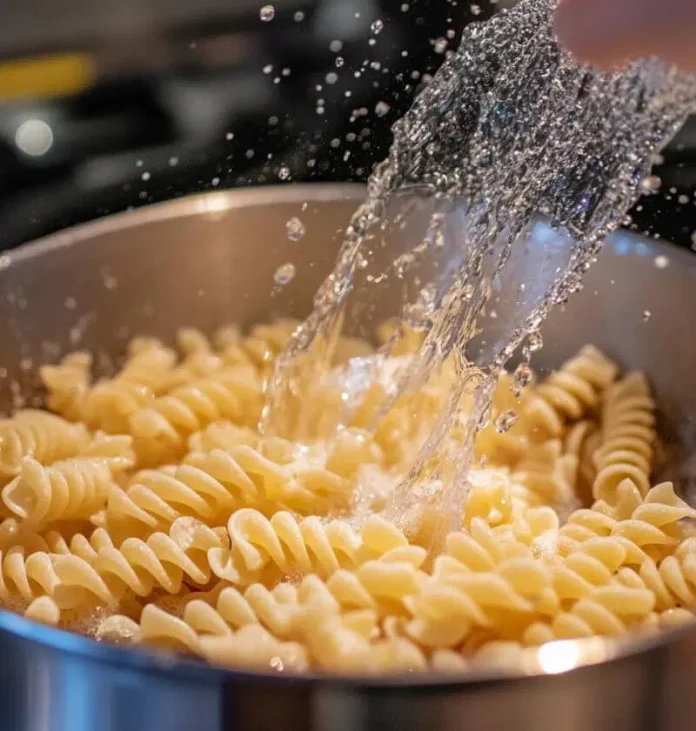Pasta is a beloved staple in countless kitchens, where achieving the perfect al dente texture is often akin to an art form. During a recent culinary session, I observed my uncle rinse freshly drained pasta under cold water—a method that baffled me. Traditionally, I had learned that this step could strip away the starches that help sauces adhere to pasta. So, what could be the rationale behind such a practice? In this exploration, we’ll delve into the reasons some opt to rinse their pasta, unpack the science behind it, and pinpoint when this method is advantageous.
Traditional Pasta Cooking Techniques
The classic approach to cooking pasta involves boiling it in well-salted water to the firm-to-the-bite stage known as ‘al dente’ and then directly combining it with sauce. This process is pivotal as the starches released during cooking act as a natural thickener, ensuring sauces meld seamlessly with the pasta.
Why Rinse Pasta?
Understanding the implications of rinsing pasta under cold water is crucial. Here’s what happens:
- Stops Cooking: Immediately rinsing pasta in cold water halts the cooking process, preventing it from overcooking and maintaining the desired texture.
- Removes Starch: While essential for hot dishes where sauce adhesion is desired, starch can be problematic in cold pasta dishes where a non-sticky texture is preferred.
- Prevents Clumping: For dishes that require the pasta to remain loose, such as salads or certain pre-prepared meals, rinsing is beneficial as it prevents the strands from sticking together.
Appropriate Times to Rinse Pasta
Though traditionally frowned upon for hot dishes, rinsing pasta can be beneficial in specific scenarios:
- Pasta Salads: For cold pasta dishes, rinsing is beneficial. It cools the pasta rapidly, removes unwanted starch, and keeps the noodles loose for a light, airy salad.
- Advance Preparation: If pasta needs to be cooked ahead of time, rinsing can prevent it from continuing to cook and sticking together. A toss in olive oil after rinsing can keep it ready for later use.
- Asian Noodle Dishes: In recipes where noodles are meant to be tossed or stirred in sauces, such as in stir-fries, rinsing removes excess starch that could make the dish gummy.
When Rinsing Pasta Is a Misstep
For most hot pasta dishes, rinsing should be avoided for several reasons:
- Sauce Adhesion: The starch on the surface of the pasta helps the sauce cling, creating a harmonious dish.
- Dish Temperature: Rinsing pasta cools it down, which can be undesirable for hot dishes as it affects the consistency and absorption of flavors from the sauce.
- Pasta Water Utilization: The starchy pasta water is often used to enhance and thicken sauces. Rinsing the pasta deprives you of this “liquid gold.”
Debunking Common Pasta Rinsing Myths
Let’s clear up some misconceptions about rinsing pasta:
- Carbohydrate Reduction: Rinsing does not significantly decrease the carbohydrate content; it only removes surface starch.
- Reviving Overcooked Pasta: Once pasta is overcooked, rinsing won’t restore its firmness, though it can stop further softening.
- Universal Necessity: Rinsing isn’t a requisite step for all pasta dishes, especially not for those served hot.
Expert Insights on Pasta Rinsing
Culinary experts typically advise against rinsing for hot dishes, suggesting instead to use the pasta water to fine-tune sauce consistency and enhance flavor integration. However, they acknowledge that rinsing has its place in the preparation of cold dishes or when making pasta in advance.
Concluding Thoughts: Tailoring Pasta Preparation
Before you drain your next pot of pasta, consider the final dish you’re aiming to create. While rinsing may be ideal for a refreshing pasta salad or a make-ahead meal, it’s generally unsuitable for hot pasta dishes where you want robust sauce integration. By understanding when and why to rinse pasta, you can adapt your cooking technique to suit the dish, ensuring optimal results every time.
Whether my uncle’s approach was correct depends largely on the intended dish. Cooking, after all, is as much about personal preference as it is about technique. Being aware of when to employ different methods like pasta rinsing empowers you to craft the perfect culinary experience, tailored to your tastes and needs.


